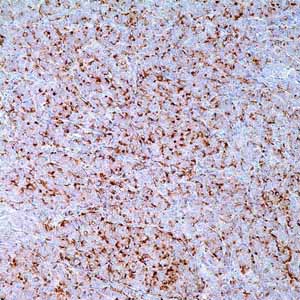
GCDFP-15 (EP1582Y)

Gross cystic disease fluid protein-15 (GCDFP-15) is one of four major component proteins found in the cystic fluid obtained from patients with fibrocystic changes of the breast. GCDFP-15 is a marker of apocrine glandular differentiation in both benign and malignant mammary epithelium.1-3 This protein has a widespread distribution in apocrine glands elsewhere in the axillary and perianal tissues, as well as in the sublingual and submaxillary salivary glands. The GCDFP-15 protein is a 15 kDa glycoprotein shown to be prolactin-inducible, and the GCDFP-15 gene has been cloned.2 Ultrastructurally, the GCDFP-15 protein has been localized in Golgi vesicle and cytoplasmic granules. The protein is released by exocytosis at the apices of the mammary epithelial cells.3 The primary application for this antibody product is the identification of breast carcinoma in the metastatic setting, or fluid analysis.5-10 In a study by Wick et al. on paraffin sections of 105 breast cancers and 585 non-mammary malignancies in order to assess its value in this context, anti-GCDFP-15 showed a consistent congruency between the reactivity patterns of primary and metastatic breast cancers. Besides mammary carcinomas, the major tumor types that express GCDFP-15 were carcinomas of the salivary glands and sweat glands. Since the latter two types of lesions are unlikely to be diagnosed as metastatic breast cancer, statistical indices were recalculated after exclusion of these three tumor types. Following this exclusion, the adjusted rate of specificity of GCDFP-15 and positive predictive value of metastatic carcinoma of the breast were each 99%.4 Another study by Bhargava et al.7 has shown GCDFP-15 staining of a higher percentage of cancer cells in lobular carcinoma as compared to ductal carcinoma of the breast.
